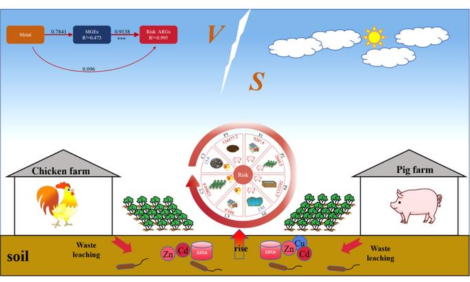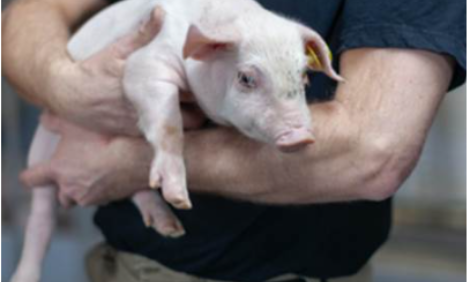



Boar taint and the castration debate
As routine castration causes unnecessary distress and pain for piglets, alternative strategies to reduce boar taint are being deployed, but what are the pros and cons of these strategies?Surgical castration of male pigs is commonly performed to avoid boar taint, or the offensive odour of pork found in sexually mature boars. Due to its painful and stressful nature, the practice has been receiving criticism from international organisations for animal protection and welfare. As a result, alternative strategies to reduce boar taint are being deployed. However, these strategies carry with them some pros and cons, and the topic has been the subject of much debate among stakeholders involved in the pork chain. Producing entire males is more profitable and efficient than raising castrates, but whole males negatively influence meat quality due to the presence of boar taint (Lundström et al., 2009).
What is boar taint?
Boar taint is a defect affecting certain sensory properties of meat (odour and taste). It can be discerned when the meat is cooked or eaten and is considered unpleasant by some consumers. Two main compounds are responsible for boar taint: androstenone and skatole. Androstenone is a male steroid pheromone while skatole is a by-product of tryptophan metabolism in the large intestine (EFSA, 2004; Andersen, 2006). The more mature the pig becomes, the more of these compounds are produced, especially androstenone; this is the main reason castration is done. Carcasses from entire males are not accepted in most of the markets due to boar taint risk.
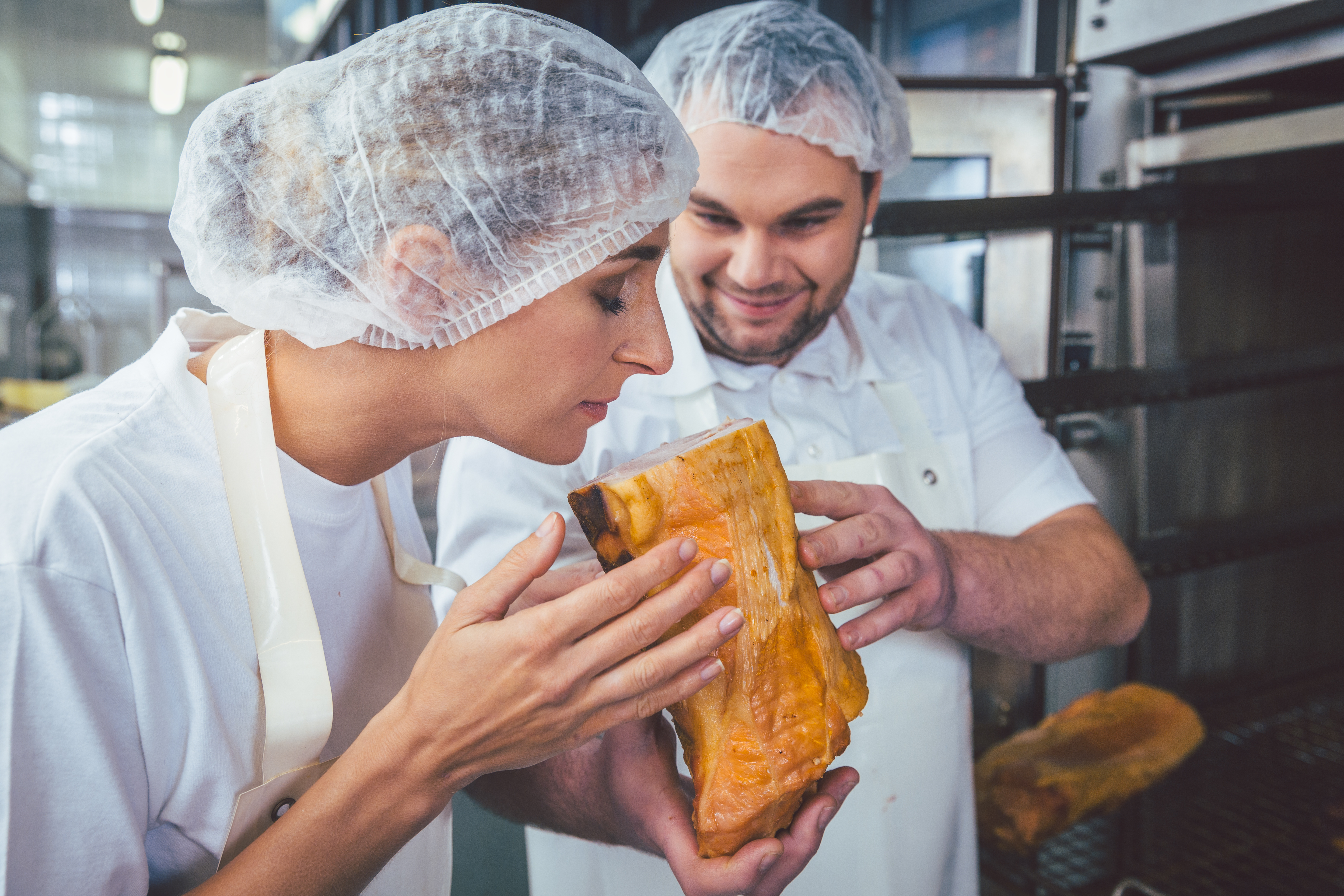
The debate
Consumer perception
The main concerns driving the case for ending surgical castration are a consideration for the pigs’ welfare – and consumers’ perception of how castration affects this — and the fact that boar taint can affect the taste and smell of meat. However, as an impairment to the product, boar taint is also subjective: androstenone can be detected by 90 percent of women but only 50 percent of men, which means many people’s taste preference is not impacted by boar taint. Some studies suggest that what you read is what you smell – meaning that product information can affect consumers’ quality perception (Wageningen University, 2013). In the same study, it was revealed that if they are not informed about boar taint, consumers’ views about the acceptance of castration vary widely. This prompts the question: for those consumers who are not informed about boar taint, and are unable to detect it, does its presence make any difference to how they experience the product?
Who in the pork chain cares?
Similarly, is boar taint of equal concern to all the stakeholders in the pork chain? From a farmer’s point of view, rearing entire males might be a better prospect, as they reduce feed costs due to faster growth, they convert feed more efficiently and they produce leaner carcasses compared to castrates (Lundström et al., 2009; Zamaratskaia and Squires, 2009). This approach to farming would also probably please environmentalists who see less nitrogen in manure from entire males compared to castrated males.
But, on the other hand, boars can show more aggressive behaviour compared to castrated pigs which are easier to manage, especially during transport and lairage (ALCASDE, 2009) and usually results in fewer meat quality defects such as PSE or DFD.
Pig welfare and castration
It is well known that castration negatively affects the welfare status of the animals and society’s growing concern for animal is making a strong case for ending castration. But, looking at it closely, it seems that the perception that castration is a bad thing overall is predominantly driven by the lack of pain relief used when conducting castration procedures on many farms. As a result, as of 2019 Germany will no longer allow castration without anaesthesia (Eurogroup for Animals, 2018). Additionally, if the pigs are not given both anaesthesia and analgesia for castration, it is unlikely that their welfare will be substantially improved. On the other hand (using Germany as an example), this decision will also affect imports to the country – negatively affecting other sectors in the pork chain.
By banning castration, the industry would be removing one source of pain and distress that piglets are subjected to whilst also eliminating one of the methods by which disease can get into young pigs. But keeping males intact and growing them to heavier weights at puberty also invites more aggressive behaviour towards each other, resulting in stress that might also jeopardise their welfare.
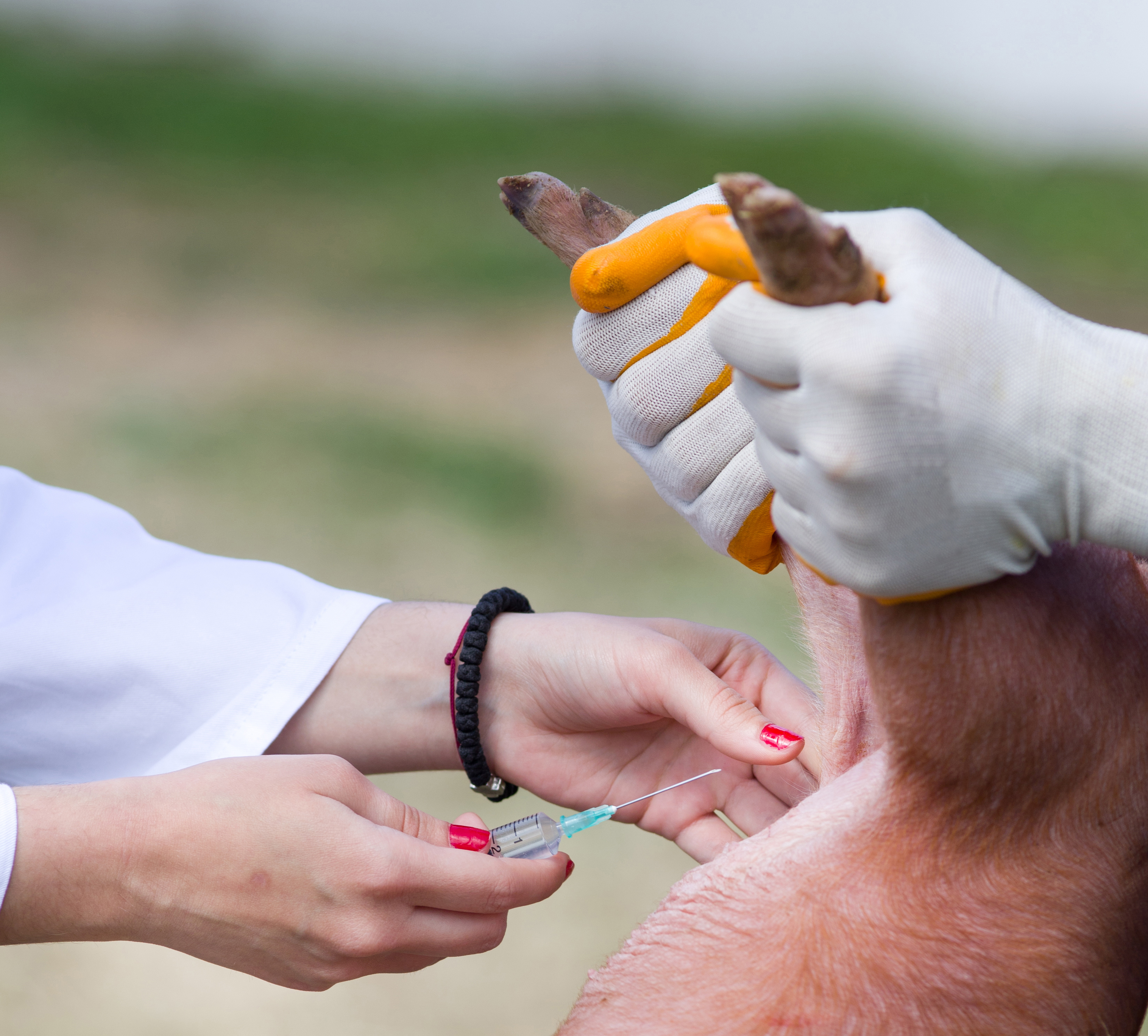
Castration methods other than surgical
Surgical castration without anaesthesia or analgesia is a painful and stressful procedure, as evidenced by a series of physiological and behavioural changes that are clearly indicative of pain and stress. The following castration methods appear to be better, but they are also not perfect.
Immunocastration: this is administered through the injection of a vaccine prior to slaughter, and it inhibits testosterone secretion and testicular function and development. This would reduce the pain and stress caused by surgical castration on-farm which is predominantly where the welfare concerns lie. But there is a sense of unease surrounding immunocastration, and there is some debate as to whether the injections do not inflict pain and stress.
Chemical castration: this consists of injecting chemicals causing local destruction of testicular tissue. In terms of welfare, it is difficult to draw definitive conclusions as further research is required to determine whether this practice causes pain (FAWEC, 2019). Complications might include injection-site lesions, handling stress to the pigs and the risk of self-injection to the stockperson.
Alternative strategies to reduce boar taint
Besides immunocastration and chemical castration, other strategies exist which centre on breeding and nutrition – but what are their pros and cons?
Breeding and genetics
Selection: breeding values on androstenone and skatole can be estimated. Preferential selection on those families that have low levels of these hormonal products can reduce the incidence of boar taint. Also, avoiding breeds with high boar taint such as Duroc, and choosing breeds with a lower incidence of boar taint, such as the Pietrain breed, can help reduce its prevalence.
Breeding females (sperm sexing): this method consists of inseminating sows with sexed sperm so that they produce only female offspring. While sperm sexing may prove to be a good solution in the long term, it is not yet viable in practice. There are also ethical concerns.
Gene-editing: pigs could be gene-edited so that they do not reach sexual maturity, and this could reduce the incidence of androstenone and skatole in male pigs. This technique is still being researched (although it has been applied to other issues in pig production).
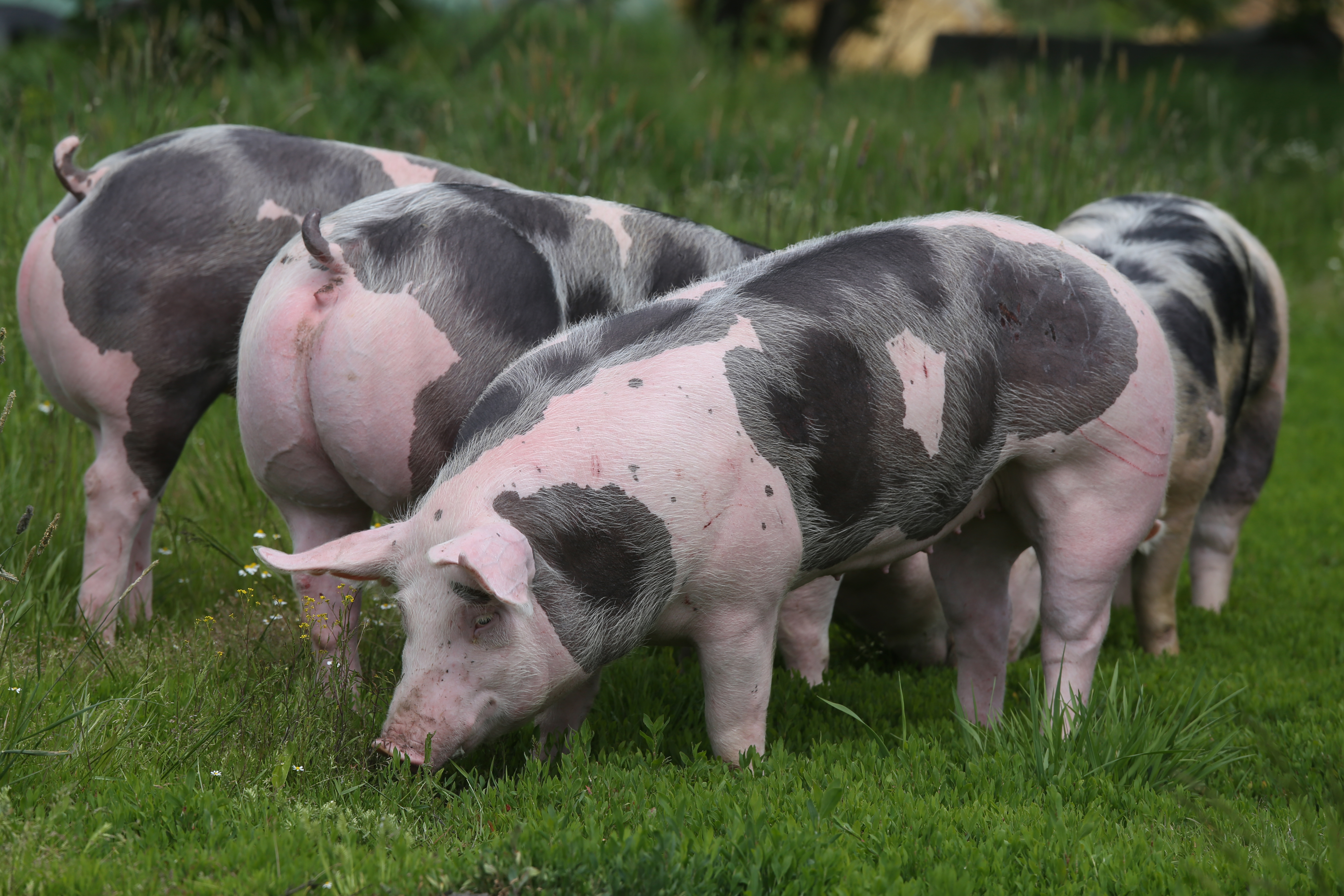
Nutrition
It helps to formulate a diet that’s specific to your breed and to avoid supplements that are known to increase boar taint. For example, skatole, and in some cases androstenone, can be reduced by altering the tryptophan levels in swine diets. Feeding chicory (inulin) has a significant effect in reducing skatole levels in the fat.
Farm-level management
Same-sex groups: ensures all boars are dealt with at once, making testing more efficient. But on the other hand this may be challenging for farmers who raise their pigs in mixed groups.
Low-stress environments: increased stress has been associated with higher levels of taint.
Reducing competition at feeding: this reduces stress, hence boar taint – but installing extra feeding equipment is costly.
Slaughterhouses management
Uncastrated pigs: systems to detect boar taint can be implemented at the slaughterhouses, where carcasses that test positive can be quantified and managed.
Vaccinated pigs: systems to check assurances from farmers that pigs vaccinated against it do not in fact contain boar taint.
Penalties for boar taint: where these might be applied, they should be combined with positive incentives to encourage farmers to raise entire males.
Legislation and outlook in the EU
Animal welfare regarding surgical castration has been a longstanding policy of the EU. Since 1 January 2012 the European Commission (EC) has mandated that surgical castration of pigs should be performed with prolonged analgesia and/or anaesthesia – but this has not been achieved to date in some European countries. The EC has also stated that surgical castration of pigs should be abandoned by 1 January 2018 – this has not been achieved either.
However, the EC’s ongoing intention is to bring surgical castration to an end by making the following tools available:
- mutually recognised methods for the assessment of boar taint;
- European standardised methods for the measurement of each of the compounds responsible for boar taint;
- rapid-detection methods for boar taint at slaughter plants;
- reduction of boar taint compounds by pig breeding and/or management and feeding;
- effective management of entire males during rearing, transport and at slaughter, to minimise sexual and aggressive behaviours.
In addition, the EC is working to ensure a sustainable and competitive pig meat chain in the EU. It is hoped that a European partnership on pig castration, supported and funded by the European Commission, will be established in order to:
- ensure the acceptance of products from pigs not surgically castrated by authorities and consumers in the European Union (but also in third-country markets);
- agree on a common definition of boar taint;
- perform or coordinate research and development;
- develop information and training for farmers and other stakeholders in the pork chain.
Eurogroup for Animals
In line with the European Commission’s objectives on castration outlined above, Eurogroup for Animals (EA), with its flagship campaign End Pig Pain, invites individuals to sign a petition asking the EU to support a EU-wide ban on surgical piglet castration by 2024. Upon reaching 1 million signatures, the petition will be handed over to the European Commission.
Final remarks
- Adopting the idea of ending castration depends on the market you’re in – all markets are totally different and have distinct products. The UK and Ireland, for example, are running entire-male herds.
- Consumer demand and preference are the main determinants of whether adopting the rearing of entire males will be achieved.
- Some experts have said that reducing boar taint on a practical level takes a multi-factorial approach whereby every stakeholder in the pork chain should play a part.
- New technology such as gene editing might offer a better solution to surgical castration – however, its applicability is still under review.
- To ensure a sustainable pig-meat chain, strategies must be developed to reduce the compounds responsible for boar taint, promote production and management systems that minimise sexual and aggressive behaviour in entire males and develop an internationally recognised method for detecting boar taint at slaughter plants that is quick, easy, cheap and reliable.
- In the end, the economic benefits of the strategies to end boar taint must be convincing to the stakeholders involved.
| References | ||||
|---|---|---|---|---|
| ALCASDE report | ||||
| (2009) | Study on the improved methods for animal friendly production, in particular on alternatives to the castration of pigs and on alternatives to the dehorning cattle.. SANCO | 18:1-65 | ||
| Andresen Ø. | ||||
| (2006) | Boar taint related compounds: Androstenone/skatole/other substances.. Acta Veterinaria Scandinavica | 48(1):5 | ||
| European Commission | ||||
| (2019) | Establishing best practices on the production, the processing and the marketing of meat from uncastrated pigs or pigs vaccinated against boar taint (immunocastrated). | |||
| Eurogroup for Animals | ||||
| (2018) | ||||
| European Food Safety Authority (EFSA) | ||||
| (2004) | Welfare aspects of the castration of piglets. Scientific Report of the Scientific Panel for Animal Health and Welfare on a Request from the Commission Related to Welfare Aspects of the Castration of Piglets (Question N8 EFSA-Q-2003-091). The EFSA Journal | 91:1-18 | ||
| Jensen B.B. | ||||
| (2006) | Prevention of boar taint in pig production. Factors affecting the level of skatole.. Acta Veterinaria Scandinavica | 48(1):6 | ||
| Lundström K. and Zamaratskaia G. | ||||
| (2006) | Moving towards taint-free pork – alternatives to surgical castration.. Acta Veterinaria Scandinavica | 48(1):6 | ||
| Wageningen University | ||||
| (2013) | Results of the 5-year Dutch research programme 'Boars heading for 2018' | |||
| Zamaratskaia G. and Squires E.J. | ||||
| (2009) | Biochemical, nutritional and genetic effects on boar taint in entire male pigs.. Animal | 3:1508-1521 |








